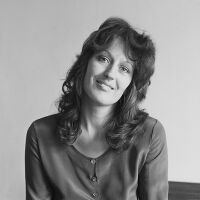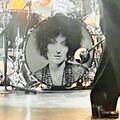Germaine Greer
Relevance
Cover star of Back On The Chain Gang. Image used as a concert backdrop in 2018, 2020 & 2023.
Drum head image used in 2023 and source image for the Back On The Chain Gang single:
Mentioned In
- Headful Of Heroes - NME (September 16, 1989)
- Low In High School Tour 2017-2018 Pre-show Tracks
- Morrissey Covers the Pretenders’ ‘Back on the Chain Gang,’ Talks ‘Pop Classic’ - Rolling Stone (November 1, 2018)
- Morrissey: Un dandy de camisa abierta - Clarín.com (Argentina) (December 2, 2018)
- The Interview. A LARKS' TONGUE IN APRIL. - Morrissey Central (June 24, 2019)
- Unsung - Morrissey Central (December 11, 2020)
- Morrissey Interview 2022. - Sam Esty Rayner / YouTube (November 27, 2022)
- Morrissey on "Good Day New York" - Fox5NY (October 20, 2023)
Wikipedia Information
 |
Germaine Greer (; born 29 January 1939) is an Australian writer and feminist, regarded as one of the major voices of the second-wave feminism movement in the latter half of the 20th century. Specializing in English and women's literature, she has held academic positions in England at the University of Warwick and Newnham College, Cambridge, and in the United States at the University of Tulsa. Based in the United Kingdom since 1964, she has divided her time since the 1990s between Queensland, Australia, and her home in Essex, England. Greer's ideas have created controversy ever since her first book, The Female Eunuch (1970), made her a household name. An international bestseller and a watershed text in the feminist movement, it offered a systematic deconstruction of ideas such as womanhood and femininity, arguing that women were forced to assume submissive roles in society to fulfil male fantasies of what being a woman entailed. Greer's subsequent work has focused on literature, feminism and the environment. She has written over 20 books, including Sex and Destiny (1984), The Change (1991), The Whole Woman (1999), and The Boy (2003). Her 2013 book, White Beech: The Rainforest Years, describes her efforts to restore an area of rainforest in the Numinbah Valley in Australia. In addition to her academic work and activism, she has been a prolific columnist for The Sunday Times, The Guardian, The Daily Telegraph, The Spectator, The Independent, and The Oldie, among others. Greer is a liberation (or radical) rather than equality feminist. Her goal is not equality with men, which she sees as assimilation and "agreeing to live the lives of unfree men". "Women's liberation", she wrote in The Whole Woman (1999), "did not see the female's potential in terms of the male's actual." She argues instead that liberation is about asserting difference and "insisting on it as a condition of self-definition and self-determination". It is a struggle for the freedom of women to "define their own values, order their own priorities and decide their own fate".





